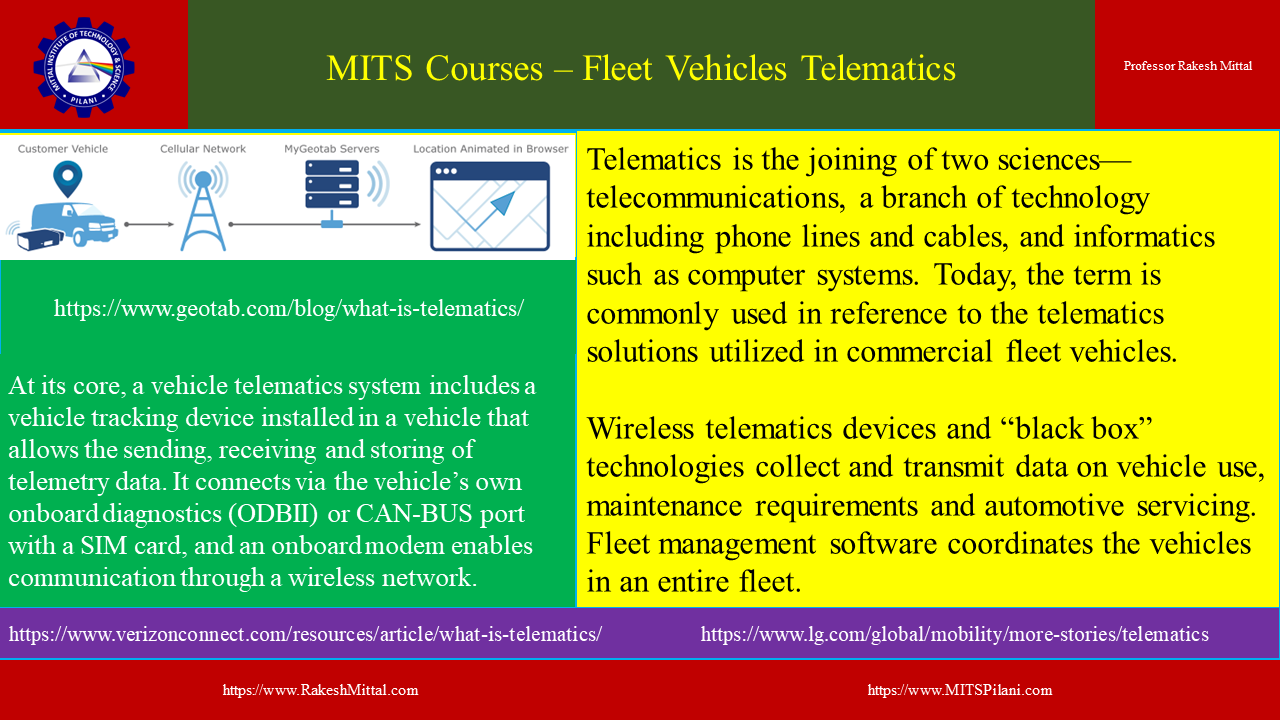

MITTAL INSTITUTE OF TECHNOLOGY & SCIENCE, PILANI
Fleet Vehicle Telematics: Enhancing Efficiency and Safety through Technology
Fleet vehicle telematics is a technology that combines telecommunications, vehicular technologies, and informatics to manage fleet operations effectively. It involves the use of GPS tracking systems, sensors, and onboard diagnostics to monitor vehicle location, driver behavior, and vehicle health in real time. Over the past decade, the adoption of telematics in fleet management has grown significantly due to its potential to optimize operations, improve safety, reduce costs, and ensure regulatory compliance.
The Components of Fleet Telematics
At the heart of fleet telematics is the combination of several components, including:
- GPS Tracking: A core element of telematics is GPS technology, which enables real-time vehicle tracking. This provides fleet managers with instant updates on vehicle locations, helping them route vehicles more efficiently, reduce fuel consumption, and improve customer service by providing accurate delivery times.
- Onboard Diagnostics (OBD): Modern telematics systems are integrated with a vehicle’s onboard diagnostics. This allows for the collection of data on engine performance, fuel consumption, and vehicle wear-and-tear. Proactive vehicle maintenance can be scheduled based on diagnostic alerts, reducing the likelihood of breakdowns and costly repairs.
- Sensors: Telematics systems include various sensors that monitor critical vehicle parameters such as speed, tire pressure, braking patterns, and fuel levels. These sensors provide valuable data on driver behavior and vehicle health, helping improve operational efficiency and safety.
- Communication Networks: The telematics system sends the data collected from vehicles to a central fleet management system via wireless communication networks. This enables fleet managers to analyze vehicle performance and make informed decisions to improve operations.
Key Benefits of Fleet Telematics
The implementation of telematics in fleet management provides numerous benefits, ranging from operational efficiency to enhanced driver safety.
- Increased Efficiency: Real-time tracking allows for optimized route planning, reducing fuel consumption and minimizing vehicle downtime. Fleet managers can also monitor driver behavior, such as excessive idling or speeding, and provide coaching to improve efficiency.
- Cost Reduction: Telematics systems help reduce operational costs by promoting fuel-efficient driving, scheduling preventative maintenance, and avoiding breakdowns. In addition, the ability to track fuel consumption accurately allows for better budget control.
- Improved Safety: Telematics systems provide insights into driver behavior, including harsh braking, speeding, and aggressive acceleration. Fleet managers can use this information to identify risky behaviors and provide training to drivers to improve their safety performance. Telematics can also automatically alert drivers to unsafe conditions, further enhancing road safety.
- Enhanced Regulatory Compliance: Telematics systems help fleet operators ensure compliance with regulatory requirements, such as Hours of Service (HOS) for commercial drivers. The data collected can be used to generate reports needed for compliance with government regulations, reducing the risk of fines or legal issues.
- Environmental Benefits: By improving fuel efficiency and reducing unnecessary trips, telematics can contribute to lower carbon emissions. Fleet operators can track fuel usage and reduce their environmental impact by adopting more sustainable driving practices and vehicle maintenance routines.
Challenges and Considerations
Despite the numerous benefits, the adoption of fleet telematics is not without challenges. Some key considerations include:
- Data Privacy and Security: The large volume of data generated by telematics systems raises concerns about data privacy and security. Fleet managers must ensure that telematics data is protected from unauthorized access and comply with data protection regulations.
- Cost of Implementation: The initial investment required for telematics hardware, software, and installation can be significant, especially for small fleets. However, the long-term savings in fuel, maintenance, and operational efficiency often outweigh the initial costs.
- Driver Privacy: The continuous monitoring of drivers can lead to concerns about privacy. Fleet operators must strike a balance between monitoring for safety and efficiency and respecting the privacy of their employees.
- Technology Integration: Ensuring that telematics systems are compatible with existing fleet management software can be a challenge. The successful integration of telematics with other management tools is crucial for gaining the full benefit of the technology.
Future Trends in Fleet Telematics
The future of fleet telematics looks promising, with advancements in artificial intelligence (AI), machine learning, and big data analytics poised to further enhance its capabilities. AI-powered telematics systems will provide even more accurate predictive maintenance, optimize fuel efficiency based on driving conditions, and offer more detailed driver performance insights. In addition, the integration of telematics with autonomous driving technologies could lead to safer and more efficient fleets.
Another emerging trend is the use of 5G technology in telematics systems, which will enable faster and more reliable data transmission. This will allow for real-time data processing and decision-making, making fleet operations even more efficient.
Fleet vehicle telematics is a game-changing technology that has revolutionized fleet management. By providing real-time insights into vehicle performance, driver behavior, and operational efficiency, telematics enables fleet managers to make informed decisions that improve safety, reduce costs, and enhance customer service. While there are challenges in implementation, the long-term benefits far outweigh the hurdles, and the future of telematics promises even more advancements in technology to further optimize fleet operations. As more companies adopt telematics, the fleet management industry will continue to evolve, leading to safer, more efficient, and more sustainable transportation systems.

Professor Rakesh Mittal
Computer Science
Director
Mittal Institute of Technology & Science, Pilani, India and Clearwater, Florida, USA
